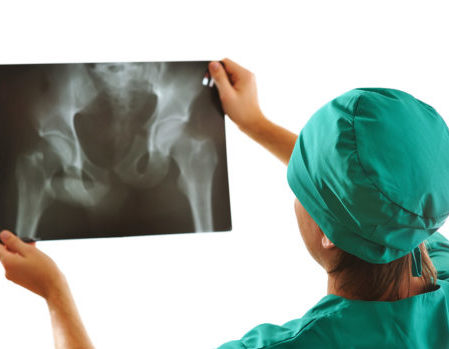Hip Fracture Treatment From a Board-Certified Orthopedic Surgeon in Louisville, KY

A hip fracture is a crack or break in the top of the thighbone (femur) near the point where it fits into the hip socket. The most common cause is a fall, particularly among older adults and those with weakened bones. A hip fracture can also develop gradually through repetitive use, which can cause tiny cracks to form in the femur near the hip joint. Athletes such as long-distance runners and ballet dancers are particularly prone to stress fractures of the hip. This type of injury may resolve on its own with rest and activity modifications; however, if left untreated, it can worsen and progress into a broken hip.
In many cases, a hip fracture causes severe pain in the hip or groin area, along with swelling, bruising, difficulty walking, and an inability to support any weight on the affected leg.
Types of Hip Fractures
A broken hip can be classified based on the location and severity of the break in the femur. The two most common types of hip fractures are:
- A femoral neck fracture – Often related to osteoporosis and athletic stress fractures, this type of injury is characterized by a break in the femur 1-2 inches below the hip joint. Due to its location, the fracture can potentially disrupt the supply of blood to the femoral head, leading to a complication known as avascular necrosis of the hip.
- An intertrochanteric hip fracture – This type of injury, which involves a break in the femur 3-4 inches below the hip joint, does not interfere with the supply of blood to the bone.
How Is a Hip Fracture Treated?
Usually, a broken hip will require surgical treatment. The optimal approach will be determined based on the location and extent of the break. One option is hip repair surgery, which involves the placement of screws, rods, plates, or other internal fixation devices to hold the broken bone together as it heals. Alternatively, a severe fracture may warrant hip replacement surgery, which involves replacing part or all of the hip joint with artificial components. Any type of hip surgery is usually followed by a customized physical therapy program designed to restore muscle strength and mobility.
If you have symptoms of a hip fracture, you should promptly consult with a physician who can provide an accurate diagnosis and suggest appropriate treatment. If you’re in the Louisville, Kentucky, area, you can consult with a board-certified orthopedic surgeon at Louisville Orthopaedic Clinic. We offer a full range of treatments for hip fractures and other musculoskeletal injuries.
Contact Louisville Orthopaedic Clinic today to schedule a consultation with a hip specialist at our full-service facility in Louisville, KY.



 Our patients can receive MRI imaging onsite at both our Louisville and New Albany Clinics.
Our patients can receive MRI imaging onsite at both our Louisville and New Albany Clinics. Providing the latest advances in orthopedic surgery is our specialty.
Providing the latest advances in orthopedic surgery is our specialty. We take a unique, multidisciplinary approach to pain management.
We take a unique, multidisciplinary approach to pain management. Our physical therapists use advanced techniques to help restore strength and mobility.
Our physical therapists use advanced techniques to help restore strength and mobility.  We provide comprehensive, conservative care for a wide variety of foot and ankle conditions.
We provide comprehensive, conservative care for a wide variety of foot and ankle conditions. We offer same- and next-day care to patients with acute injuries.
We offer same- and next-day care to patients with acute injuries. Get back in the game with help from our sports medicine specialists.
Get back in the game with help from our sports medicine specialists.  Our centers are equipped with a state-of-the-art digital X-ray machine.
Our centers are equipped with a state-of-the-art digital X-ray machine.